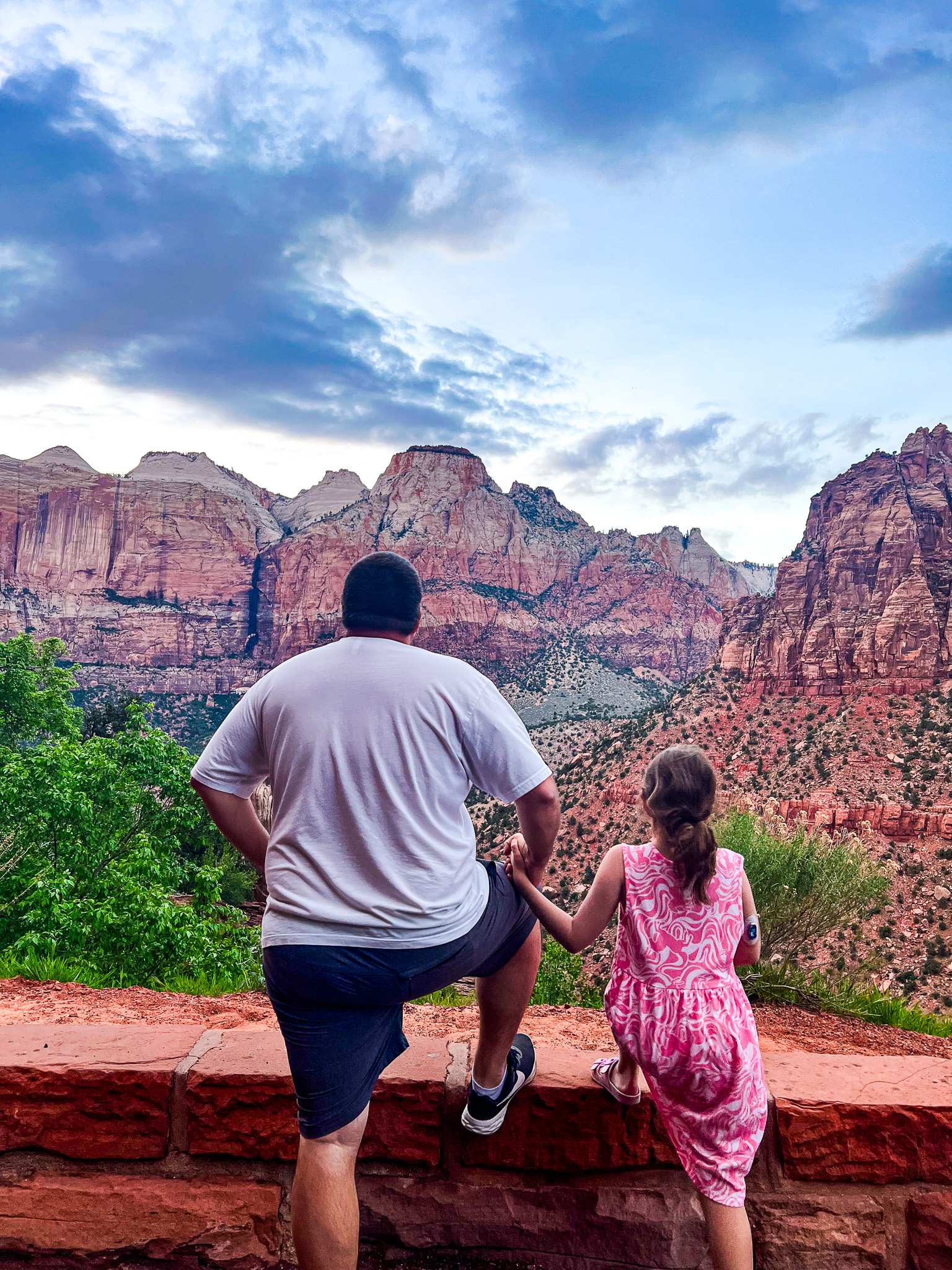This guide will provide you with essential tips for RVing with diabetes, ensuring you are ready for anything the road throws your way.
RVing offers a unique way to explore the world, providing the freedom to travel at your own pace and visit places off the beaten path. For those with diabetes, this lifestyle can be both exciting and challenging.
Managing diabetes on the road requires careful planning and preparation, but it doesn’t have to limit your adventures. With the right strategies, you can enjoy a safe and fulfilling RV journey.
Preparing for the Trip
Consult Your Healthcare Provider
Before embarking on your RV adventure, it’s crucial to consult with your healthcare provider. A pre-trip checkup can help ensure you are in good health and ready for travel. Discuss your travel plans and any potential impacts on your diabetes management. Your doctor may need to adjust your medication or insulin dosage based on changes in activity levels, time zones, or diet.
Packing Essentials

Packing the right supplies is vital for managing diabetes on the road. Create a checklist to ensure you have everything you need:
- Medications and Insulin: Bring an ample supply of all your medications, including insulin. It’s wise to carry extra in case of delays or emergencies.
- Testing Supplies: Pack your glucose meter, testing strips, lancets, and a logbook. Continuous glucose monitor (CGM) users should bring additional sensors.
- Storage Solutions: Insulin and some medications need to be kept cool. Invest in a good-quality cooler or portable fridge for your RV. We opted for a residential fridge in our RV to ensure that the temperature doesn’t vary too much.
- Emergency Supplies: Include items such as glucagon kits, ketone test strips, and a medical alert bracelet. Have a list of your medications and dosages in your wallet or on your phone.
Travel Insurance
Having comprehensive travel insurance is essential. Ensure your policy covers chronic conditions like diabetes and includes emergency medical evacuation. Review the coverage details to understand what is and isn’t included, and carry your insurance information with you.
On the Road
Managing Blood Sugar Levels
Traveling can disrupt your regular routine, making blood sugar management more challenging. Here are some tips to stay on track:
- Regular Monitoring: Check your blood sugar levels more frequently while traveling. Changes in activity, diet, and stress levels can affect your readings.
- Maintain a Routine: Try to stick to a regular schedule for meals, medications, and blood sugar testing. Set alarms if necessary.
- Stay Hydrated: Dehydration can affect blood sugar levels. Drink plenty of water, especially in hot weather.
Healthy Eating on the Go
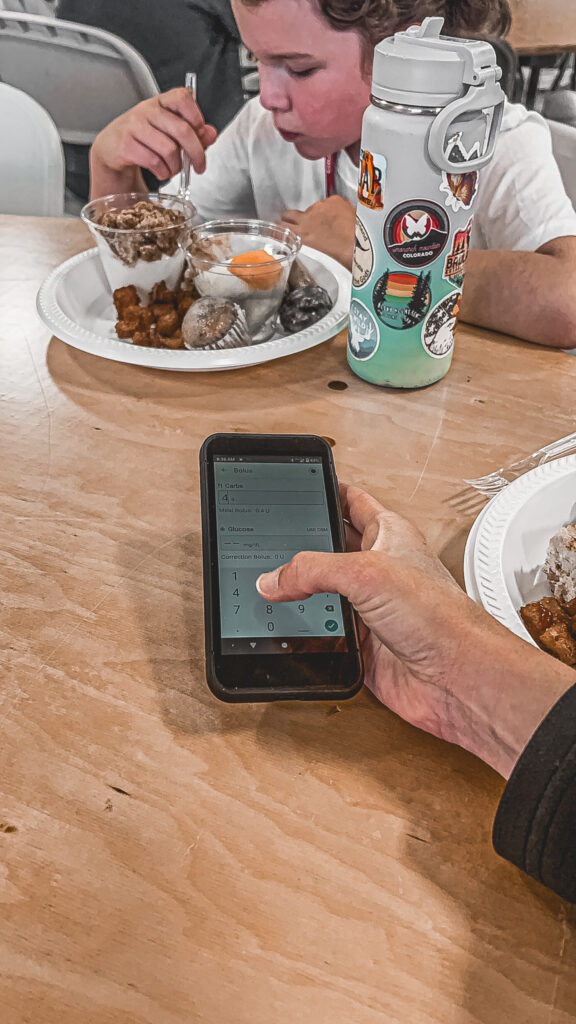
Eating well on the road is key to managing diabetes. With some planning, you can enjoy healthy meals and snacks:
- Meal Planning: Plan your meals ahead of time and stock up on diabetes-friendly foods. Fresh vegetables, lean proteins, and whole grains should be staples in your RV pantry.
- Cooking in the RV: Take advantage of your RV’s kitchen to prepare balanced meals. Grilled chicken, vegetable stir-fries, and salads are easy to make and nutritious.
- Eating Out: When dining out, choose restaurants that offer healthy options. Opt for grilled rather than fried foods, and ask for dressings and sauces on the side.
Staying Active
Physical activity is important for managing diabetes, and RVing offers many opportunities to stay active:
- Walking and Hiking: Explore trails and parks near your campsite. Walking is a great way to keep your blood sugar in check.
- Exercise Routine: Bring along portable exercise equipment like resistance bands or yoga mats. Incorporate a short workout into your daily routine.
- Outdoor Activities: Engage in activities like biking, swimming, or kayaking. These not only help with blood sugar control but also enhance your travel experience.
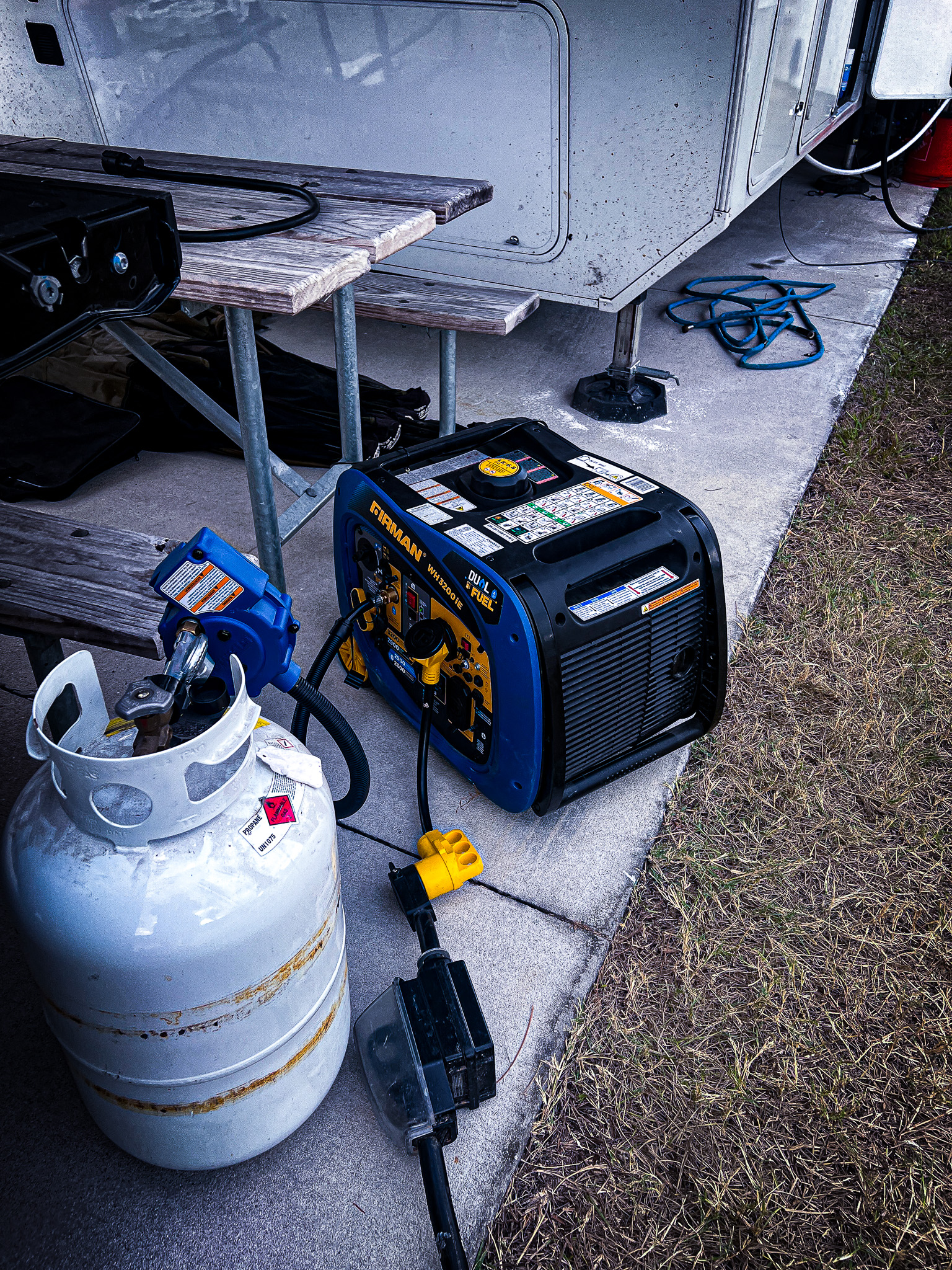
Handling Emergencies
Creating an Emergency Plan
Having a plan in place for emergencies can provide peace of mind:
- Emergency Contacts: Keep a list of emergency contacts, including your healthcare provider, nearest hospitals, and close family members.
- Medical Information: Carry a card that lists your medical conditions, medications, and emergency instructions. Store it in an easily accessible place.
- Action Plan: Know the steps to take in case of severe hypoglycemia or hyperglycemia. Share your plan with your travel companions.
Finding Medical Help on the Road
Accessing medical care while traveling can be challenging, but there are resources available:
- Nearby Hospitals and Clinics: Research medical facilities near your planned stops. Apps like Google Maps can help locate hospitals and clinics.
- Telemedicine Services: Many healthcare providers offer telemedicine services, allowing you to consult a doctor remotely.
- Pharmacies: Identify pharmacies along your route where you can refill prescriptions if needed.
Dealing with Common Issues
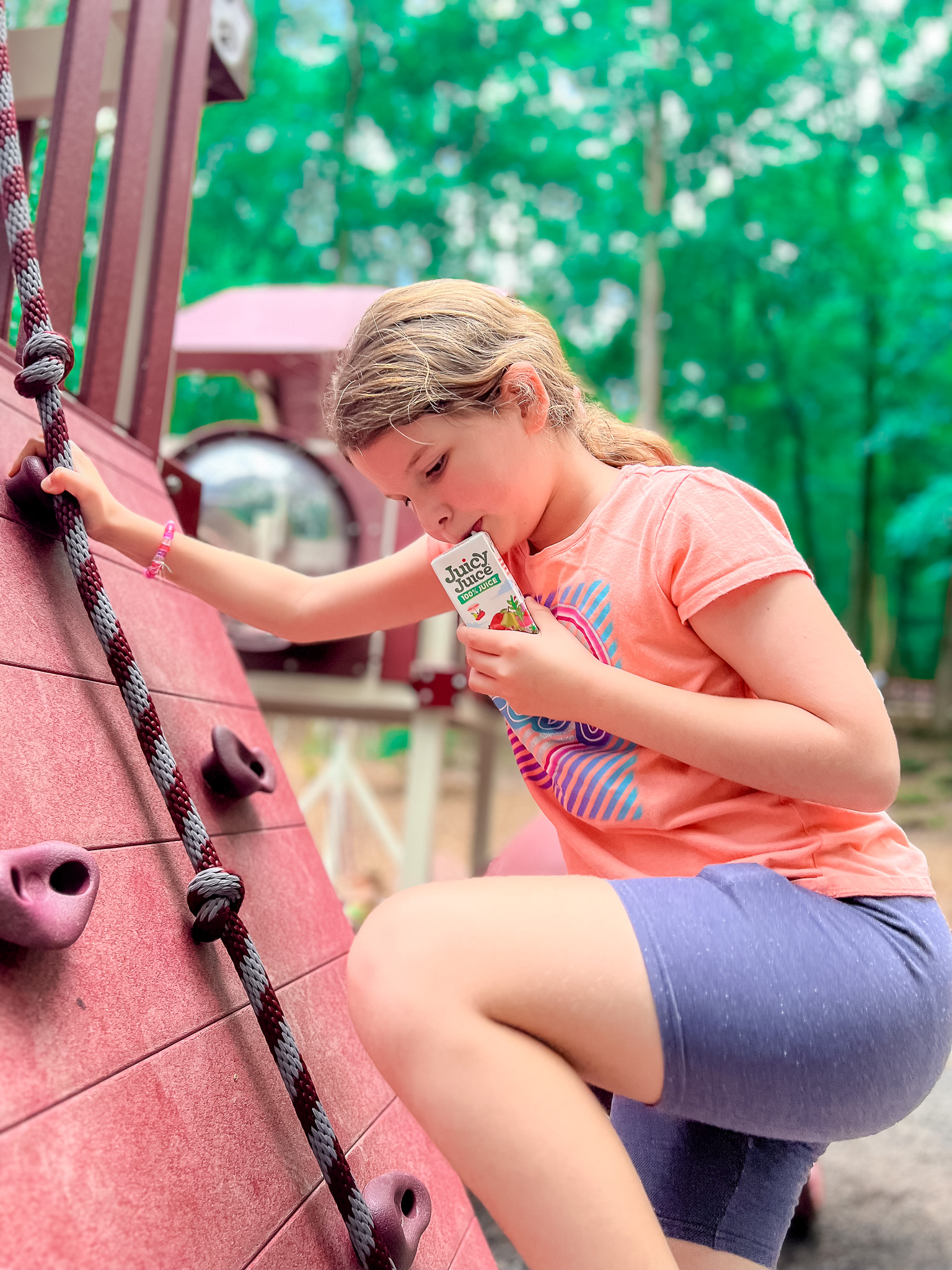
Be prepared to handle common diabetes-related issues on the road:
- High Blood Sugar (Hyperglycemia): Stay hydrated, monitor your blood sugar closely, and follow your doctor’s instructions for adjusting insulin.
- Low Blood Sugar (Hypoglycemia): Keep fast-acting carbs, like glucose tablets or juice, readily available. Recognize the symptoms and act quickly.
- Extreme Weather: Hot or cold weather can affect your diabetes management. In hot weather, keep insulin cool and stay hydrated. In cold weather, protect your supplies from freezing.
Sharing Your Experience
Connecting with Other RVers with Diabetes
Building a support network can be incredibly helpful:
- Online Communities: Join online forums and social media groups for RVers with diabetes. Share your experiences and learn from others.
- Local Meetups: Attend RV rallies or diabetes events to connect with fellow travelers. Sharing tips and stories can provide encouragement and support.
Raising Awareness
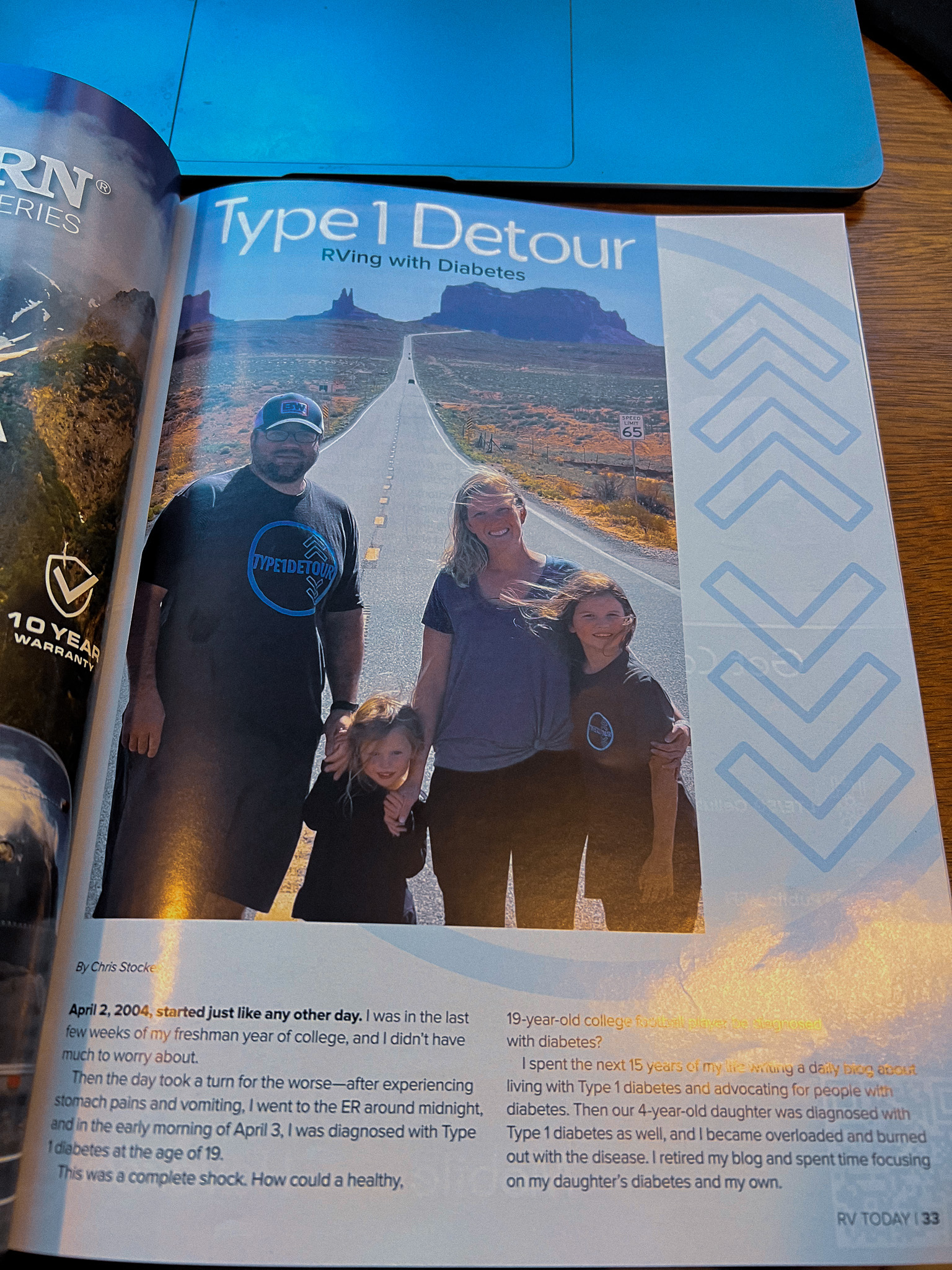
Educating others about diabetes can foster understanding and support:
- Informing Travel Companions: Explain your diabetes management to those you travel with. Teach them how to recognize and respond to emergencies.
- Public Awareness: Use your travel blog or social media to raise awareness about diabetes. Share your journey and inspire others to pursue their travel dreams despite health challenges.
Traveling with diabetes requires careful planning and preparation, but it should not hold you back from exploring the world in your RV.
By following these tips and staying proactive about your health, you can enjoy a safe, fulfilling, and adventurous journey. Remember, the road is full of possibilities, and with the right mindset and tools, you can embrace every moment.
Share your tips and experiences in the comments or on social media, and let’s build a supportive community of RVers ready to tackle the open road, diabetes and all.
